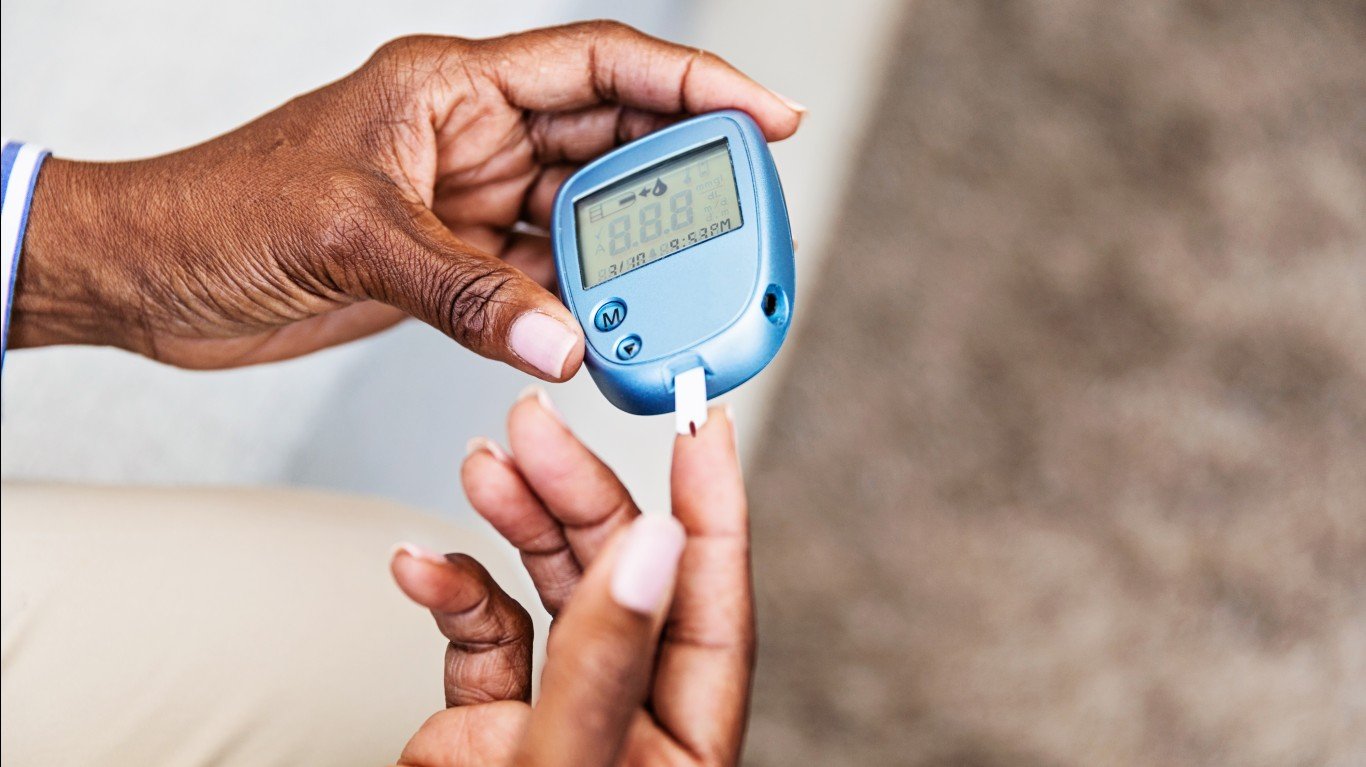Special Report
These 4 Conditions Send Many COVID-19 Patients to the Hospital, Researchers Say

Published:
Last Updated:

The pace at which COVID-19 spreads across American has slowed. Confirmed cases in the United States have reached 28,904,197 to date, about 25% of the world total — but cases per day have dropped to about 2,000, about half what they were seven weeks ago.
Likewise, while coronavirus deaths in America account for about 20% of the global global total, numbering 519,014 to date, they’re rising at about half the pace they did two months ago.
One strong ray of hope is that hospitalizations across the country have dropped below 50,000 a day for the first time in four months. The news is no reason for people to drop their guard, however, particularly if they have one of four pre-existing conditions that scientists believe pose the greatest risk. That’s true even if they live in one of the states that have done the best job rolling out vaccines.
Click here to see the 4 conditions that may send many COVID-19 patients to the hospital

What are the most dangerous pre-existing conditions for DOVID-19 patients?
In a new study published in the Journal of the American Heart Association (JAHA), the Gerald J. and Dorothy R. Friedman School of Nutrition Science and Policy at Tufts University did a statistical analysis of COVID-19 hospital patients. Medical.net summarized the conclusions: The greatest risks to those affected with COVID-19 are “obesity, hypertension, diabetes, and heart failure, in that order.”
[in-text-ad]

The prevalence of obesity
Unfortunately, a large percentage of the U.S. population is obese. According to the Centers for Disease Control and Prevention (CDC), among adults, “The prevalence of obesity was 42.4% in 2017~2018.” That number has been rising for decades. This is the most obese city in America.

Hypertension is a major health concern
Hypertension — high blood pressure — has become a significant problem among the American population. According to the CDC, it was a primary or contributing cause of death for more than 494,873 people in the United States in 2018. Based on one widely used definition of hypertension, it affects as many as half of America’s adults.

Diabetes is common particularly among older Americans
According to The National Diabetes Statistics Report, 2020, over 34 million Americans have diabetes. Just as alarming, 88 million Americans have pre-diabetes, which is characterized in part by higher than normal blood sugar.
[in-text-ad-2]

Heart failure is another major problem
About 6.2 million adults in the U.S. currently suffer from some form of heart failure, according to the CDC, and in 2018, it claimed some 379,800 Americans. The aforementioned conditions — obesity, hypertension, and diabetes — can all contribute to heart disease, as can smoking, excessive alcohol intake, poor diet, and lack of physical activity.

Vaccinations can help keep even those with co-morbidities out of the hospital
Among the primary weapons for keeping people out of hospitals due to COVID-19 is vaccination. The Pfizer and Moderna vaccines, which have been in the market for two months, were recently joined by one from Johnson & Johnson. About 15% of adult Americans have been given one vaccine dose, and almost 8% have received two shots. These are the worst hospitals in America.
[in-text-ad]

Herd immunity will cut hospital stays, too
The ultimate goal to prevent high fatalities from COVID-19 is herd immunity. While the definition varies among experts, it usually means that 70% to 80% of the population has either been infected or vaccinated. If new variants or carelessness about social distancing and mask-wearing do not cause another spike in the disease, hospitalizations should continue to fall.
A financial advisor can help you understand the advantages and disadvantages of investment properties. Finding a qualified financial advisor doesn’t have to be hard. SmartAsset’s free tool matches you with up to three financial advisors who serve your area, and you can interview your advisor matches at no cost to decide which one is right for you. If you’re ready to find an advisor who can help you achieve your financial goals, get started now.
Investing in real estate can diversify your portfolio. But expanding your horizons may add additional costs. If you’re an investor looking to minimize expenses, consider checking out online brokerages. They often offer low investment fees, helping you maximize your profit.
Thank you for reading! Have some feedback for us?
Contact the 24/7 Wall St. editorial team.